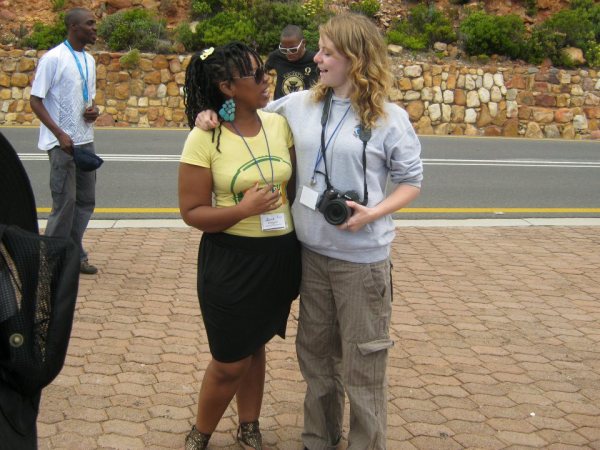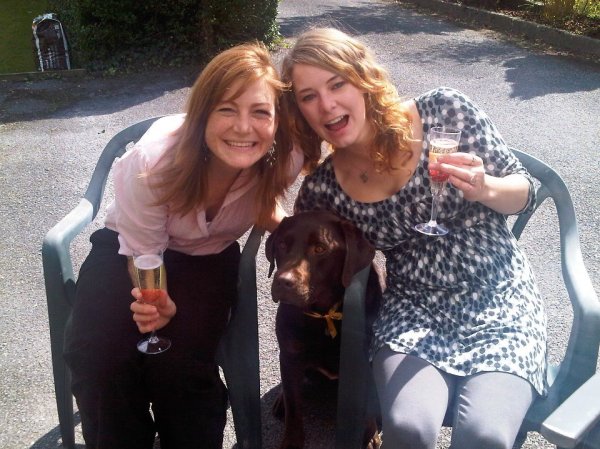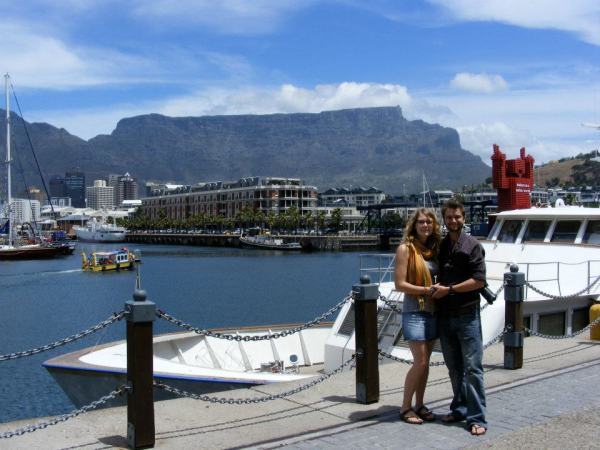So you want to be an international student?
I’ve been terrible at blogging lately, for a number of reasons. Most of them centre around the consequences of choosing to do a PhD abroad. Realising this, I figured why not write a little about my experiences as an international PhD student and share some insight in to an option that many students will consider at some point in their academic careers. Whilst my experience is in a “Briton moving to South African” context, I hope the advice is broadly applicable to anyone.
Most people respond with some sort of wide eyed wonder when you discuss how you study in some more or less exotic place far from home. But is it all a dream come true to experience different cultures and explore distant lands whilst studying? Well, from someone with a few years experience and many international colleagues – it’s sometimes a dream and sometimes it’s a total nightmare!
Some benefits of studying abroad are obvious – check out my facebook albums of me climbing table mountain, sipping sauvignon blanc amongst picturesque vineyards and following baby elephants across deserts! Beyond the fun, studying abroad equips you with other experiences both academic and personal which can be incredibly valuable for your career. Meeting new people with completely different backgrounds can give invaluable perspective – vital for heading up multi-institutional research collaborations and conducting the kind of interdisciplinary science and stake holder engagement work so crucial in todays world. I’ve learnt so much about communicating science here, because not only do I have to communicate to non specialists, but also with due care to and with input from an incredibly diverse range of cultures. Literally moving to a new region to study your chosen subject can teach you much about your subject too. South Africa has one of the most unique oceanographic situations in the world and, for me, provides a clear contrast of exciting oceanographic regions to compare.
You also get to share your experience with friends and family (as I have this last month). It’s a heartwarming feeling being able to have your parents come and stay in a little cottage you found under a world heritage site, to show them your new life which is often totally different from anything you had before and share the adventure with them. I had the chance to bring my mother back to the country she grew up in for the first time in 30 years and to finally see the place my grandparents worked in and told me stories of. It helped me understand what has formed them as people.
Sounds great. But before you jump on a plane to some far away place to study, I have some tales of caution – those nightmares I was referring too. Not to say that a PhD at home cannot cause you some of these problems, but I’ve often felt them exacerbated here without the support network of home and when faced with additional challenges compounded.
There’s an enormous, even overwhelming number of practicalities associated with a PhD or in fact any period studying abroad. Visas, bank accounts, phone contracts, a place to live – all have to be sorted out. Moving can be difficult – it’s a pain but not too difficult or pricey to hire a van to drive 4 hours away from home to a new university. What do you do when all you have is a 28kg luggage allowance and (if like me you’re straight out of university) little disposable savings and often high levels of debt?

Finding somewhere to live is difficult when you don't have time or resources to look at lots of places
The pressure to pick the right institution and most importantly the right topic and supervisor is heightened by the fact that you often can’t meet a potential supervisor/visit an institution and once your there you’ve already committed a significant amount of money and time to making this move happen. You often won’t know quite what you’re in store for until you hit the ground with your backpack and maybe a B&B booked! You’ll be used to the way your previous institutions work. Plymouth and Southampton were different universities but I found most of my needs as a student taken care of – I was given maps, contact details for necessary administrators and if I had a problem I knew who to speak to, money arrived on time in cheque form every 3 months, registration was dealt with through efficient online services, applications went through UCAS or through the department you were applying to. None of this was the case in South Africa. Nobody knew the whole picture of where I had to go and what I had to do, even to satisfy the basic requirements of registration and funding access. There was no welcome party. I was lucky to have contacts here before I arrived – a place to stay and people to make sure I wasn’t homeless/without cash or advice. Monumental administrative errors meant I had to reapply on arrival – a delay of a month on registration and 2 months on funding arriving. Here’s some key points of advice to avoid potential problems:
– Make contacts before you arrive: Ask your supervisor/new head of department to put you in touch with existing students and help you find a place to stay for a while so you can set up bank accounts and look for a place of your own without spending a fortune on B&B’s etc.
– Learn the processes: Ask all the questions you can possibly think of. I made the mistake of thinking someone would tell me what I needed to do when I arrived. I’ve since learnt you need to know the systems better than the people you’re dealing with to get things done. This may not be the case world wide, but you’ll never go wrong if you know what’s going on. What are the admissions requirements? Which forms need to go to faculty/department/university?
– Check your funding: How much? How long for? When will it be paid? By who? Will they deduct fees? For someone who is living off their bursary as a sole income, you often cannot afford for it to be delayed or uncertain. For me this really caused huge problems. How can you study when you’re constantly worried about paying your rent? I’ve seen great students leave institutions because of this and without the support I had here I would have been one of them. It also doesn’t hurt to have your own financial back up. Can you work for 6 months to a year to give yourself that support? Although it shouldn’t be necessary, it will make your life a lot easier if you can. There are hidden costs to a PhD abroad too. Visas cost money (it’s a 600 pound repatriation deposit for a study permit in South Africa), I had to buy health insurance (no NHS here!) and what about going home? That’s another 600 pound without spending money! Living costs? Cars are expensive here, I couldn’t afford one, so I have to share – these are the things you need to consider BEFORE making a judgement about whether you can undertake a PhD project abroad.
– Lifestyle: I was told during my masters not to pick your PhD by location, but to pick by project/supervisor. Very sound advice. Without a good supervisor and a project you enjoy, you’re unlikely to finish. However I think you’re equally unlikely to finish if you don’t have a life you enjoy outside of work. I have a good work/life balance and living in Cape Town has allowed me to indulge in many new hobbies which help reduce the stress of a bad day with my PhD – in the long run keeping me chilled out and helping me work better.
– Make extra sure of your project and supervisor: The majority of the problems I see amongst my colleagues result from insufficient project supervision – whether they have developed their project outside of their original supervisors expertise and not found someone else to assist or the supervisor is not giving them enough help. Not all places in the world send out recruitment for PhD students on a project basis as is common in the UK. This can be beneficial – giving you the academic freedom to tailor a project to your strengths and interests. However making a decision to move half way around the world without at least a basic project outline and knowledge of your supervisors field could be unwise.
– The emotional cost: I’ve not seen my mum in 6 months now and I left behind my dear pet dog and all my friends. Whilst my parents and friends can visit, it makes me sad all the time that I can only see my grandparents once a year – and that’s with research collaborations in the UK meaning I’m home. It’s not always easy to have visitors too. I’ve loved showing my mum and dad and their partners around but 3-4 two week visits a year and you’ve already far exceeded what any normal job would allow you to have as holiday. That’s extra pressure on your workload. It’s easy when you can pop around for dinner once a month but when it’s once a year and someone has spent in excess of 1000 pounds visiting you, you’re compelled to enjoy the time you have together. At a young age people will tell you that you shouldn’t settle down and a career is most important but realistically you may face leaving a relationship behind. On the plus side, you’ll meet an amazing array of new people who you share common up ands downs with – I’ve made friends for life here and have a relationship where the idea of moving around the world isn’t inconceivable.

You'll miss family and friends but surprising them for special occasions makes great memories! (Nan and Grandad's 50th wedding anniversary)
There’s little things you’ll miss regardless (where are my parsnips and why doesn’t South Africa have good cider?!!!?!?!?!) but full blown culture shock is also possible. Maybe you’ll feel isolated away from home? Different cultural norms, languages etc can add to this. Living behind window bars has been an adjustment for me and dealing with the security fears placed in to my head by the western media proved difficult when I was on my own. South Africa is a fascinating place, characterised positively and negatively still by a turbulent past. Growing up in an environment where I’ve never had to deal with the hardships endured by people in this country heightens the injustice I feel for many South Africans. Though always compelled to help, how best to do so is not always clear and that can be hard to deal with at times, but can also mean you’re involved in lots of inspirational work.

Travelling the country, meeting inspirational people and teaching have been some of the real highlights of studying in South Africa

Meeting inspirational people and making new friends and colleagues is a definite benefit to studying abroad
The take home message is that you can have some of the greatest experiences of your life moving abroad to study and you can learn a lot too. But these things come with costs – often financial but also emotional. Costs you must seriously consider if you can afford and want to pay. If you want to pursue an international move, go for it. People may call you “lucky” if you do but the reality is a lot of hard work and bad times go in to a move like this even if the benefits are phenomenal 🙂
If you have any advice or thoughts on international study, please add in the comments section.











Out of all the things you could possibly miss you list cider and parsnips? 2 out of the 5 things I don’t and won’t eat! Madness.
Not cider? What the hell is wrong with you man!?
Also I know what you mean, when I did ERASMUS in Italy massive isolation issues, plus there were Italians everywhere.
Cool work Hayley, thank you 4 sharing you valuable insights with us and gooluck with the future.
wow….you are very nice & honest … thanx for sharing… love.